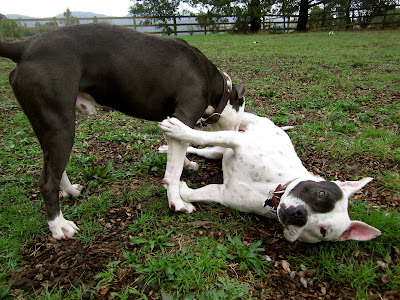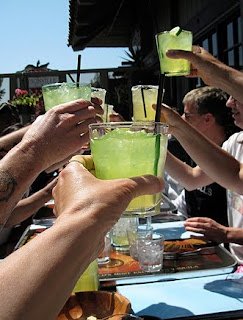
This is Olive.
She has a bit of a story to tell: In August 2010, she entered a Southern California shelter as a stray with puncture wounds on the back of her thigh. We're assuming a dog grabbed her from behind when she was out on the streets, most likely as she was trying to get away from those teeth. It's anybody's guess what happened to her, but her shelter intake notes tell us that she was quite shaken when she arrived. Four days later, she stared pointedly at a dog during her evaluation. She stiffened, gruffed and threatened, "Back off, or else." Based on that reaction and her general discomfort around dogs, her evaluator determined that she was dog aggressive.
Because this shelter embraces a no-kill mission, she was set to live out her life in the kennels until she could be adopted. Because she was labeled as dog aggressive, it was going to be a long
looong wait.
As far as we can tell, there was no game plan for socializing Olive to other dogs once she flunked that part of her evaluation. There would be no training classes, play sessions, group walks, off site visits or quiet time next to quiet dogs. A note on her intake form revealed that Olive was sensitive and flinched at loud noises. She was kenneled in the middle of the usual shelter chaos, with clanging kennel doors and barking dogs on either side of her and across from her. A half wall separated her from her neighbors, just tall enough so she could argue with them if she jumped - or, if the other dog jumped up to argue with her.

Olive was isolated in a secluded location in the back of the shelter. Because of her presumed behavior with dogs, no one was allowed to take her out without special permission. Her only daily exercise was a quick 15 minute visit to a small side yard. As the months wore on, she would flatten herself to the ground as she was moved from the kennel to the yard, shrinking from the barking along her path. She was shut down and would not return her handler's affection, but she would roll over for belly rubs. She would ignore the toys they offered her. She would then slink back to her sterile kennel and wait another 23 and three quarter hours to go outside again.
She didn't attend adoption events, and families that spotted her photo on the shelter's website were warned away because of her initial evaluation. During these months in isolation, she was only able to interact regularly with three people. She had no toys or bedding in her kennel, so she relieved her tedium by jumping up and down and barking at neighbor dogs, nearly tearing a ligament in her knee.
Olive's shelter file lacks any notes on behavior and training efforts, but is thick with info about vets visits. It seems her health suffered during her internment. She developed a rash on her belly and an infection on her vulva from sitting on a urine soaked floor. Her toes became swollen. Her eyes were constantly running. She battled multiple ear infections. She was treated for these issues and received pain meds for the knee tear. She was spayed and microchipped. The vet was alerted in big bold type to be aware that she was 'DOG AGGRESSIVE USE CAUTION.'
After nearly two years in this situation, the shelter's board started wondering what to do about Olive and five other dogs who were in the same boat. A solution was found: As part of their mission she could not be euthanized, but she could be moved to a place that would kennel her for life. A 'no-kill sanctuary' was identified just outside of Houston, Texas. For a sizable down payment plus eighty dollars a month, Olive would live in a dirt floor pen with a plywood doghouse, surrounded by similarly rejected and kenneled dogs. If she lived out her life expectancy, she would spend the next dozen or more years inside this pen. She would never leave it for training, exercise, walks, new adventures, socialization, or adoption events - but because she was still alive, the arrangement would fulfill the shelter's philosophy and monthly upkeep checks would be sent.
 So long story short,
So long story short, Olive's five neighbor dogs were sent to Texas, but just before she was supposed to follow them, fate intervened and she ended up in our Rescue Barn.
She arrived here Jan 5th, so is three weeks into unraveling from her ordeal over the last 18 months. We've been watching her melt off stress like a snowman in July. She was initially guarded when she arrived and flinched easily. She stared our dogs down as if waiting for them to launch (they didn't of course). She ran her first zoomies in months, then tail tucked and darted away from some unseen danger. She fluctuated between being ridiculously happy and stiff and wide-eyed worried, as if waiting for the other shoe to drop. She was essentially acting like a crisis survivor with post traumatic stress disorder.

Dogs are better at letting go than we are though, and with a little support, we can help speed up the process. Within days, after a lot of sleep and some time taking stock of her new surroundings, she started greeting the on-site dogs with wags and friendly interest. Instead of loud barking, she listens to jazz on the radio, visitors' voices and the whirl of a washer/dryer now. She sleeps on a chair in her kennel fluffed with blankets. She nibbles on fresh grass. She tosses toys in the air and sparkles for her new human friends. She watches the sun rise through the barn window and as the day opens up, she peers out on the dogs' morning play sessions.
After proper intros, her first full contact (on leash) dog greet was with Elliot. She danced and wagged for his attention. She nosed small dog Blink through her kennel and softened. When she met new boy Clive through her kennel, she acted like a love sick school girl. "Squee! He's so sexy. He smells so good. I want to meet him!" A week after Clive was neutered, they had their first play date. A few days after that, she had her first play session with Blink. She hasn't been able to stop smiling.
Her play style is clumsy and awkward, but in true dog fashion, the others have been showing her the ropes. "This is how you play bow." "This is how I tell you that I want you to take it down a notch." "This is what the chase game is!" Because it's likely that Olive wrestled with her siblings when she was a pup,
she remembers.



Olive's life was put on hold when she entered the SoCA shelter. Instead of finding comfort and opportunities to succeed with other dogs, she was asked to endure a very lonely, highly stressful existence that very well could've destroyed her mind. Our team is treating her as if she were from a cruelty case right now, since her initial behavior matches what we've seen coming out of these cases. Not unlike victims of hoarding and dog fighting operations, dogs from longterm kenneling situations can initially act unsettled, fearful, hyper-sensitive and undersocialized after lengthy exposure to noise and to other stressed dogs, especially with no chance to develop or practice normal relationships with dogs
or people.
On a positive note, Olive loves to play and the happier she is, the more well grounded she seems to get. Whether she can get caught up with enough life skills to enjoy the bigger world is still an unknown, but we're hopeful. For now, we're just asking her to decompress and learn how to be a dog again.

 The Five Freedoms
The Five Freedoms
Progressive shelters follow the 'Five Freedoms' as a basis for humane care of their animals. It was originally drafted in Britain way back in the 1960's as a best practices guideline for housing farm animals. Zoos refer to it as a guidepost for their operations, as well. The
Center for Shelter Dogs promotes the Five Freedoms and explains that understanding a dogs' basic needs "will enable shelter staff and organizations to not only manage the (dogs') stress, but all to improve their welfare by addressing their needs."
Five Freedoms for Captive and Kenneled Animals
1. Freedom from Hunger and Thirst – by ready access to fresh water and a diet to maintain full health and vigor.
2. Freedom from Discomfort – by providing an appropriate environment including shelter and a comfortable resting area.
3. Freedom from Pain, Injury or Disease – by prevention or rapid diagnosis and treatment.
4. Freedom to Express Normal Behavior – by providing sufficient space, proper facilities and company of the animal's own kind.
5. Freedom from Fear and Distress – by ensuring conditions and treatment which avoid mental suffering.
Freedom to enjoy the company of an animal's own kind gets skipped in most busy shelters. Dogs are highly social creatures who've evolved as a species to depend on relationship for their very survival, not only with other dogs, but with humans. (Recent science tells us that their domestication started as long as 33,ooo years ago.
Link) It's not surprising that behaviors will degrade when they're denied opportunities to socialize.
We need animal shelters, even though they really are one of the most unnatural places any dog can find herself. The constant stress and isolation can spiral any dog into anti-social behaviors, especially if the dog came from a bad start. Instead of blaming the dog (or the breed!), it becomes the obligation of animal welfare workers - especially those who profess to be no-kill - to work to meet all of their shelter dogs' many needs and to acknowledge when an environment is doing more harm than good. It's a challenge, for sure - This work takes an incredible amount of time, human resources and regular soul-searching reality checks. But simply kenneling dogs to keep them alive "no matter what" betrays the very mission of providing compassionate solutions to dogs-in-crisis in the first place.
Following up: The shelter that housed Olive is said to be reviewing their policies regarding their care of undersocialized dogs, and we support them in this endeavor. We hope Olive made a difference in some small way. Whether they decide to send more dogs just like her to the Texas sanctuary for a lifetime sentence is an unknown.
Meet Olive in this video, enjoying the tail end of her first play session with 'Blink.' Please wish her well. She's come a long way, and we'd love to see her go the distance.
UPDATE: Video below of Olive's first play session in a group, filmed in March 2012. And news. Olive has found a
home. She's now living with a male elderbull named Zoolander and cats and a couple who are thrilled to have her in their lives. We are
over the moon.
Unfortunately, the shelter where she came from continues to send dogs in their care just like Olive to the Texas sanctuary (
Smiling Dog Farms). The public is not allowed to view the dogs that live there, so the conditions that they endure are an unknown.
And a
VIDEO - Lessons from Olive - . that outlines the steps we took to help her learn how to be a dog again.
Thanks to all who cheered her on from your corners.














































 Enter the Unexpected Pit Bull Calendar. This generous group of dog loving photographers from organization
Enter the Unexpected Pit Bull Calendar. This generous group of dog loving photographers from organization 